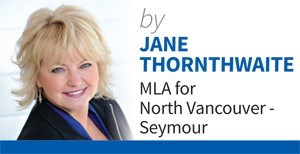One of the most important issues that comes up in conversations with constituents is the current real estate market.
Many on the North Shore fear their children will not be able to purchase a residence in the area they grew up in. I myself face this reality with my three children. The provincial government is taking some steps to address this and more will be done in the coming months.
On March 18, Premier Christy Clark announced British Columbia is taking further action on real estate agent conduct, conflict of interest and housing affordability. The provincial government is putting new rules in place to prevent the potentially predatory practice of real estate contract assignment (so-called “shadow flipping”).
Real estate contract assignment refers to the practice where some real estate licensees and some purchasers have taken advantage of rapidly rising prices by using assignment clauses to acquire a client’s home then assign the contract to a third party for a profit. New provincial rules will prevent the abuse of assignment clauses by requiring the express consent of the seller and mandating that any profits from assignments are returned to the homeowner.
With increasing demand for housing from a strong economy and steady population growth, and a limited supply of housing, prices for single-family homes in most areas of Greater Vancouver have increased between 45 per cent and 70 per cent over the last five years. Prices for multi-family homes, in contrast, have increased between 14 per cent and 40 per cent. The most recent data show there are about as many single-family dwellings in the Vancouver census metropolitan area as in 1991, while the number of condominium units doubled in that time.
In the 2016 budget, the province changed the property transfer tax to help the market respond to mounting demand for housing. The newly built home exemption offers an incentive for buyers to purchase new construction priced up to $750,000 by providing property transfer tax relief up to $13,000.
Also, proposed changes to the property transfer tax act will authorize the government to collect new information from owners when they register their property. The government will resume collecting data that specifically identifies foreign purchasers. Beginning this summer, individuals who purchase property will need to disclose if they are citizens or permanent residents of Canada and, if they are not, their citizenship and country of residence.
The 2016 budget also includes measures to provide more affordable housing options for lower-income earners. Capital spending of $355 million over five years will support the construction or renovation of more than 2,000 affordable housing units in communities throughout the province.
If you have any ideas and thoughts you want to share on this issue, please email me at [email protected].
What are your thoughts? Send us a letter via email by clicking here or post a comment below.



